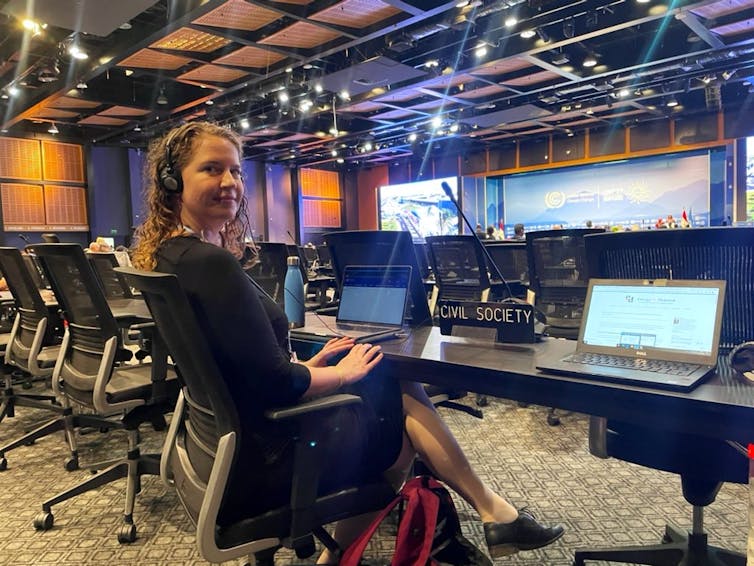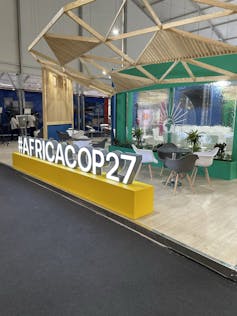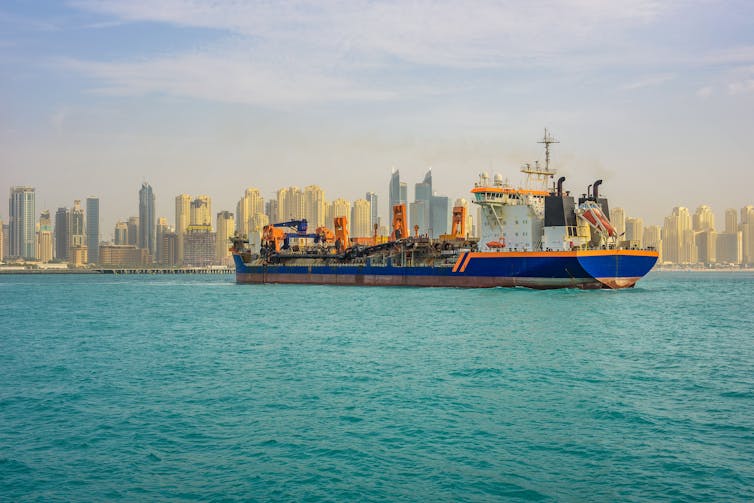COP27 has just wrapped up. Despite much excitement over a new fund to address “loss and damage” caused by climate change, there is also anger about perceived backsliding on commitments to lower emissions and phase out fossil fuels.
As an academic expert in climate justice who went along this year, hoping to make a difference, I share this anger.
“Together for Implementation” was the message as COP27 got underway on November 6 and some 30,000 people descended on the Egyptian resort town of Sharm El Sheik. The UNFCCC strictly regulates who can attend negotiations. Parties (country negotiation teams), the media and observers (NGOs, IGOs and UN special agencies) must all be pre-approved.
I went along as an NGO observer, to represent the University of Bristol Cabot Institute for the Environment. Observers have access to the main plenaries and ceremonies, the pavilion exhibition spaces and side events. The negotiation rooms, however, are largely off limits. Most of the day is spent listening to speeches, networking and asking questions at side-events.

The main role of observers, then, is to apply indirect pressure on negotiators, report on what is happening and network. Meaningful impact on and participation in negotiations seems out of reach for many of the passionate people I met.
Who does – and doesn’t – get a say
It has long been known that who gets a say in climate change governance is skewed. As someone working on fair decision making as part of a just transition to less carbon-intensive lifestyles and a climate change-adapted society, it is clear that only the most powerful voices are reflected in treaties such as the Paris Agreement. At last year’s COP26, men spoke 74% of the time, indigenous communities faced language barriers and racism and those who could not obtain visas were excluded entirely.
Despite being advertised as “Africa’s COP”, COP27 further hampered inclusion. The run up was dogged by accusations of inflated hotel prices and concerns over surveillance, and warnings about Egypt’s brutal police state. The right to protest was limited, with campaigners complaining of intimidation and censorship.

Arriving in Sharm El Sheik, there was an air of intimidation starting at the airport, where military personnel scrutinised passports. Police roadblocks featured heavily on our way to the hotel and military officials surrounded the COP venue the next morning.
Inside the venue, there were rumours we were being watched and observers were urged not to download the official app. More minor issues included voices literally not being heard due to unreliable microphones and the constant drone of aeroplanes overhead, and a scarcity of food with queues sometimes taking an hour or more. Sponsored by Coca Cola, it was also difficult to access water to refill our bottles. We were sold soft drinks instead.
Outside of the venue, unless I was with a male colleague, I faced near constant sexual harassment, hampering my ability to come and go from the summit. All these issues, major and minor, affect who is able to contribute at COP.
Fossil fuel interests dominated
In terms of numbers, the United Arab Emirates (UAE) registered the largest party delegation with more than 1,000 people. The oil and gas-rich nation of just 9 million people had a delegation almost twice the size of the next biggest, Brazil. More troublingly, the oil and gas lobby representatives were registered in the national delegations of 29 different countries and were larger than any single national delegation (outside of the UAE). According to one NGO, at least 636 of those attending COP27 were lobbyists for the fossil-fuel industry.

Despite the promise that COP27 would foreground African interests, the fossil lobby outnumbers any delegation from Africa. These numbers give a sense of who has power and say at these negotiations, and who does not.
Protecting the petrostates
The main outcomes of COP27 are a good illustration of the power dynamics at play. There is some good news on loss and damage, which was added to the agenda at the last moment. Nearly 200 countries agreed that a fund for loss and damage, which would pay out to rescue and rebuild the physical and social infrastructure of countries ravaged by extreme weather events, should be set up within the next year. However, there is no agreement yet on how much money should be paid in, by whom, and on what basis.
Much more worryingly, there had been a push to phase out all fossil fuels by countries including some of the biggest producers: the EU, Australia, India, Canada, the US and Norway. However, with China, Russia, Brazil, Saudi Arabia and Iran pushing back, several commitments made at COP26 in Glasgow were dropped, including a target for global emissions to peak by 2025. The outcome was widely judged a failure on efforts to cut emissions: the final agreed text from the summit makes no mention of phasing out fossil fuels and scant reference to the 1.5℃ target.
Laurence Tubiana, one of the architects of the Paris Agreement, blamed the host country, Egypt, for allowing its regional alliances to sway the final decision, producing a text that clearly protects oil and gas petrostates and the fossil fuel industries.
The final outcomes demonstrate that, despite the thousands who were there to advocate for climate justice, it was the fossil fuel lobby that had most influence. As a climate justice scholar, I am deeply worried about the processes at COPs, especially given next year’s destination: Dubai. It remains to be seen what happens with the loss and damage fund, but time is running out and watered down commitments on emissions are at this stage deeply unjust and frankly dangerous.![]()
----------------------
This blog is written by Cabot Institute for the Environment member Dr Alix Dietzel, Senior Lecturer in Climate Justice, University of Bristol. This article is republished from The Conversation under a Creative Commons license. Read the original article.
 |
| Dr Alix Dietzel |
